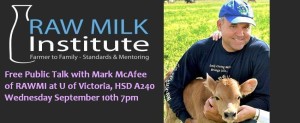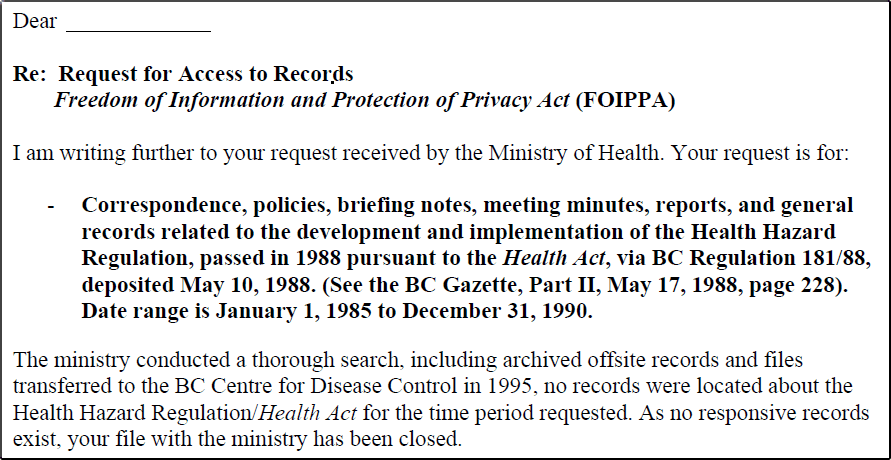 About 120 people attended Mark McAfee’s September 10th presentatio at the University of Victoria, both UVic students and members of the community.
About 120 people attended Mark McAfee’s September 10th presentatio at the University of Victoria, both UVic students and members of the community.
The title of Mark’s talk was: “The New Science of Farm-Fresh, Unprocessed Milk: Does It Still Constitute a Health Hazard?” To give some background on why this is relevant, in 1988 in BC, the Health Hazard Regulation (now the Health Hazards Regulation) was passed under the Health Act (now the Public Health Act), defining raw milk as being a health hazard:
| “Division 1 — Food / Hazardous food” ” 2 The following are prescribed as health hazards: (a) milk for human consumption that has not been pasteurized at a licensed dairy plant in accordance with the Milk Industry Act;” |
The penalties for “Causing a Health Hazard” are severe:
| 15 A person must not willingly cause a health hazard, or act in a manner that the person knows, or ought to know, will cause a health hazard.99 3) A person who contravenes either of the following commits an offence: (a) section 15 [causes a health hazard];108 (1) In addition to a penalty imposed under section 107 [alternative penalties], a person who commits an offence listed in (c) section 99 (3) is liable on conviction to a fine not exceeding $3 000 000 or to imprisonment for a term not exceeding 36 months, or to both. |
What is very interesting about this law – which has shut down herdshares; forced BC dairy farmers to sell their animals and in at least one case, into dire poverty because she no longer has an income from agistment; led to health inspectors threatening farmers with the loss of their farms; and saddled other farmers with tens of thousands of dollars in legal fees, fines, and paying the court costs of the health authorities which charged them, is that the BC government has no documented evidence that this law was ever necessary: no studies, correspondence, reports, briefing notes, or any other proof on file. This is evidence from a recent FOI request:

Mark’s talk addressed the question, “Is it a health hazard?” He provided plenty of hard data, scientific evidence that it is not. He detailed the “Grass to Glass” best practices for producing farm-fresh, unprocessed milk; the critical control points which farmers must be aware of, and how these best practices can produce an even cleaner milk than pasteurized.
We hope that some of the people in government and in the health authorities who were invited to this talk attended it, and if they were not able to make it, that they see the video of the talk once it is posted online. The BCHA will also continue to engage in dialogue with the government and the public health community, in order to find a way forward that enables our farmers, and our communities, to survive and thrive without fear.
Is unprocessed milk a health hazard? It is sold in over 600 stores and from farms in California, is available again from stores and from farms in Washington State (and regularly brought across the border into BC by shoppers). There have been no deaths from it in the United States since it began being tracked in 1972, and over 12 million Americans regularly drink it. Qualitative Risk Management Analysis (QRMA) studies and RAWMI date proves it. Our answer is “No.”
Many thanks to Dr. Martha McMahon for providing this wonderful facility for this lecture, for inviting the students in her classes, and for inviting Mark into her classroom to address the students as well. Many thanks as well to all our volunteers, including Jackie, Bijan, Alice, Steve, and the many others who helped make this event possible.
Thanks the Saanich Voice Online for videotaping this event for posting online.